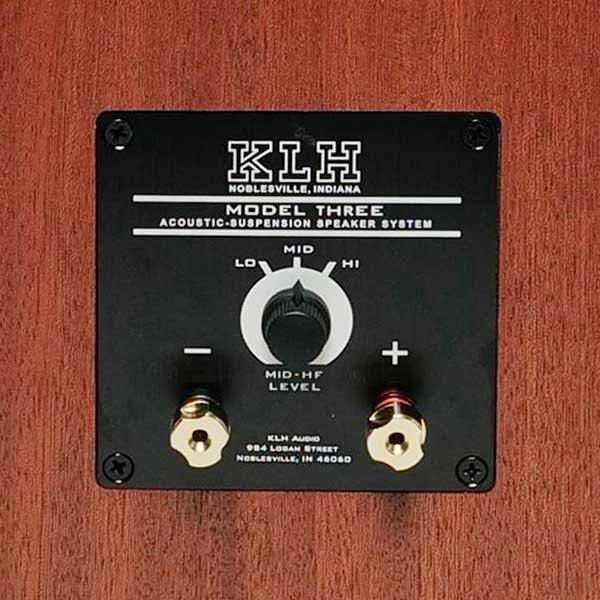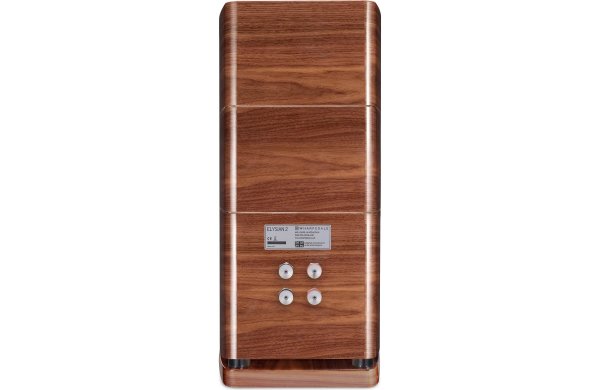In this review, we will be comparing Model Three and Elysian 2, two Passive Bookshelf speakers from KLH and Wharfedale.
Let's have a brief look at the main features
of KLH Model Three and Wharfedale Elysian 2 first before getting into our more
detailed comparison.
KLH Model Three Key Specs
- 2-way Design
- 1" Tweeter
- 8" Pulp-Paper Cone Woofer
- 46-20k Hz Frequency Response
- 88 dB Sensitivity
- Impedance: 6ohms
- Power Range:30-150watts
- Weight:13.20kg
- Dimensions (H x W x D): 482.0" x 12.25" x 10.5"( 482.0 x 311.0 x 267.0mm )
Wharfedale Elysian 2 Key Specs
- 3-way Design
- 27x90mm" AMT (Ribbon) Tweeter
- 6" Midrange
- 8.5" Coated Fiberglass Woofer
- 6" Midrange
- 35-22k Hz Frequency Response
- 89 dB Sensitivity
- Impedance: 4ohms
- Power Range:25-250watts
- Weight:30.50kg
- Dimensions (H x W x D): 700.0" x 13.1" x 18.1"( 700.0 x 334.0 x 462.0mm )
What size room are the KLH Model Three and Wharfedale Elysian 2 speakers good for?
The size of the room in which you are planning to use these loudspeakers is an important decision
factor. Here we have compared their suitability to various sizes of environments considering their size
and max power parameters:
| Listening Environment* |
KLH Model Three |
Wharfedale Elysian 2 |
| Near-field |
Poor |
Poor |
| Small Room |
Average |
Poor |
| Mid-size Room |
Good |
Good |
| Large Room |
Average |
Good |
| Very Large Room |
Poor |
Average |
(* Approximate Room sizes: Small < 100sq. ft / 9 m2,
Mid-size: 100-220 sq. ft / 9-20 m2, Large 220-400 sq. ft / 20-36 m2, Very Large: >
400 sq. ft / 36 m2.
Average Floor Height: 9" / 2.7m. Typical room sizes differ from country to country, and the actual
listening experience changes depending on floor height, room shape, surface materials, listening
position, speaker locations, etc.)
In the following sections, we will get into more detail in order to better understand how the KLH Model Three and Wharfedale Elysian 2 compare and hopefully end up with enough arguments to decide which one of these loudspeakers is the better choice for you.
**This post contains affiliate links, and I will be compensated if you make a purchase after clicking
through my links. As an Amazon Associate I earn from qualifying purchases.
Drivers
One of the fundamental differences between these two speakers is that Model Three is a 2-way design whereas the Elysian 2 is a 3-way speaker. 3-way designs utilize a midrange driver in addition to the tweeter and woofer on 2-way designs. Designing a crossover for a 3-way speaker is a complicated process and generally increases the overall cost of the speaker.
| Driver |
KLH Model Three |
Wharfedale Elysian 2 |
|
Driver Setup
|
2-way
|
3-way
|
|
Tweeter
|
1-inch
|
27x90mm-inch
|
|
Midrange
|
- |
1 x 6-inch |
|
Woofer
|
1 x 8-inch
|
1 x 8.5-inch
|
Model Three features a 1" Aluminum Tweeter and 1 x 8" Pulp-Paper Cone Woofer with a Crossover frequency at 1600Hz. On the other hand, the Elysian 2 features a 27x90mm" AMT (Ribbon) Tweeter , a 6" Midrange and 1 x 8.5" Coated Fiberglass Woofer with a Crossover frequency at 360Hz and 2900Hz.
Frequency Response
Model Three has a frequency range of 46-20k Hz whereas Elysian 2 has a frequency range of 35-22k Hz. With a minimum frequency of 35Hz, the Elysian 2 can go significantly deeper on the low side and provide stronger bass compared to the Model Three's min frequency of 46Hz.
Below graphs depict how these two speakers compare with the max, min and average values of the Min and Max Frequencies of other speakers in the Bookshelf class in our database.
Low Frequency
Bookshelf Speakers
High Frequency
Bookshelf Speakers
None of these speakers achieves full range experience which is commonly agreed as 20Hz-20kHz. In order to achieve lower lows / deeper bass, we recommend you pair these with a subwoofer. Visit our Powered Subwoofers section to find out more about the available options.
Impedance and Sensitivity
Model Three is a 6 ohms speaker compared to the Elysian 2 which has a nominal impedance of 4 ohms. Lower impedance speakers, especially the ones that are rated at 4 ohms may put more pressure on the amplifier unit especially when played at high volume levels, so make sure the amp you pair with the Elysian 2 can provide this impedance level.
These two speakers also have different sensitivity levels. Model Three sensitivity is rated at 88 dB and the Elysian 2's is rated at 89 dB. This 1 dB difference makes the Wharfedale Elysian 2 a more sensitive speaker compared to KLH Model Three, hence will play louder with the same amount of watts.
Sensitivity
Bookshelf Speakers
Power Range
Power
range is the range of input power in watts RMS that a loudspeaker is designed to handle. While using
an amplifier within this range ensures the nominal performance , inputting a power that is higher than the
max wattage can result in a damaged speaker.
Model Three can handle a max power of 250 watts RMS from the amp the whereas Model Three has a max power handling value of 150 watts RMS , 100 watts less than the Elysian 2.
Keep in mind that a higher max power handling value doesn't necessarily make that a louder speaker
compared to a lower max handling speaker. Loudness or the sound level is also impacted by parameters
such as Impedance, sensitivity and system efficiencies.
Input Type and Bi-Amping / Bi-Wiring
Elysian 2 features Post posts which make bi-amping or bi-wiring possible. Model Three has a Binding post which doesn't feature bi-amping/bi-wiring.
 KLH Model Three's Binding post terminals
KLH Model Three's Binding post terminals
 Wharfedale Elysian 2's Post terminals allows Bi-amping or bi-wiring
Wharfedale Elysian 2's Post terminals allows Bi-amping or bi-wiring
Physical Specs
Size of a speaker can sometimes become an important decision factor due to space constraints or in some cases purely for esthetic reasons. In this section, we are going to compare KLH Model Three's and Wharfedale Elysian 2's external dimensions. KLH Model Three has external dimensions of 482.0 x 311.0 x 267.0mm ( 19.0 x 12.25 x 10.5inch) whereas Wharfedale Elysian 2 has external dimensions of 700.0 x 334.0 x 462.0mm ( 27.5 x 13.1 x 18.1inch) .
Wharfedale Elysian 2 is clearly the larger of the two speakers. Its body is 23mm wider, 218mm taller and 195mm deeper than KLH Model Three.
Base Surface Area Comparison
Base surface area of a loudspeaker may become a determining factor when the space in your room or desk is limited.
The base surface area of the KLH Model Three is approximately 830.4cm2 / 128.7inch2 and base area of the Wharfedale Elysian 2 is approximately 1543.1cm2 / 239.2inch2. The Model Three requires 46% less surface area than the Elysian 2 which gives it a small advantage on placement in tight spaces.